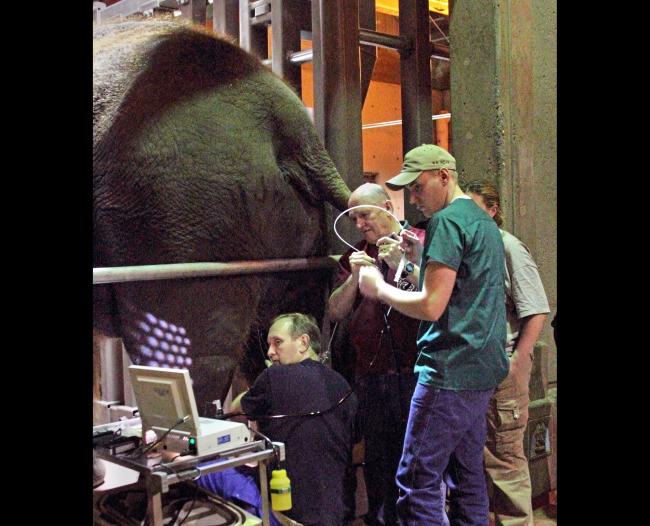Woodland Park Zoo elephant artificially inseminated
Chai was artificially inseminated over the weekend.
Mon, 03/14/2011
Staff at Woodland Park Zoo has artificially inseminated Chai, the zoo’s 32-year-old Asian elephant. The procedure, which was conducted over the weekend, is to preserve the Asian elephant population in North American.
From the press release:
“The world’s leading experts on elephant health and breeding, including the Asian Elephant Species Survival Plan, recommend that we breed Chai again, by artificial insemination,” explained Dr. Nancy Hawkes, the zoo’s General Curator and resident expert in elephant reproductive physiology.
“A baby would be socially enriching not only for Chai, but for the herd. A successful pregnancy and birth would help us begin to re-build a multigenerational social group here at the zoo.”
A 12-year-old bull at Albuquerque Biological Park Zoo contributed the semen. With no offspring to date, he is genetically valuable to the North American population of elephants.
The gestation period for elephants is 22 months. It will be approximately 15 to 16 weeks before the zoo can confirm a pregnancy by ultrasound and through hormonal changes in Chai. If she is pregnant, her due date will be in early 2013. The last artificial insemination procedure on Chai was done last year in June. It did not result in a pregnancy.
“Chai is very healthy and in excellent condition for pregnancy. Our fingers are crossed that she has conceived. Chai is a very good mother and we are confident she would use those maternal skills with a new calf,” said Bruce Upchurch, the zoo’s Curator of Behavioral Management and Elephants.
Artificial insemination is a non-invasive technique that uses technology developed within the last decade. The assisted reproductive procedure offers a safe alternative for elephants (cows) to become pregnant without needing to travel to another institution for breeding and spending months away from their social group.
According to Upchurch, Chai was characteristically calm throughout the procedure. “Chai shares very strong, positive relationships with the elephant keepers who have invested hours and hours over many years to condition her for this procedure. Each training session is designed to be safe and positive and her health and well being is our priority,” said Upchurch. “Chai enjoys the personal attention and especially likes the oodles of fresh cantaloupe, carrots and other treats to help pass the time during the procedure. She can choose to participate or not. We follow her cues.”
In addition to the Asian Elephant Species Survival Plan (SSP), Woodland Park Zoo currently participates in more than 30 SSPs. SSPs are cooperative breeding programs to help ensure genetic diversity and demographic stability of endangered species in North American zoos and aquariums. The programs also involve a variety of other collaborative conservation activities such as research, public education, reintroduction and field projects.
All of the elephants at Woodland Park Zoo are female. In addition to Chai, the other members of the herd are 44-year-old Asian elephant Bamboo and 42-year-old African elephant Watoto. Hansa, Chai’s female offspring born in 2000, died unexpectedly at 6½ years old from a newly discovered elephant herpesvirus.


